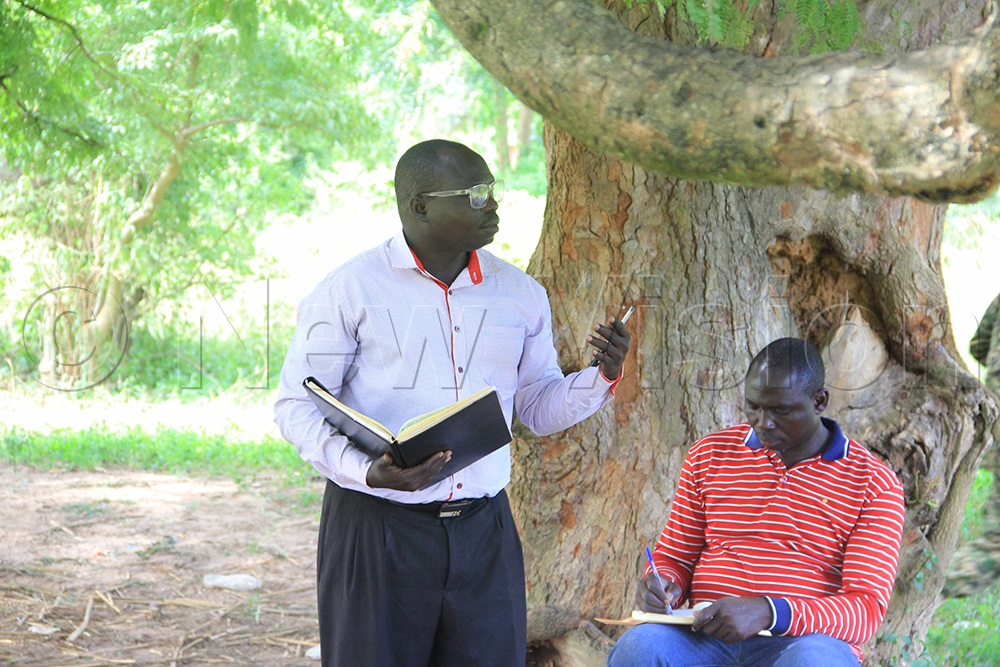Buliisa farmers, herders finger-point over stray cattle in gardens
The farmers say that over the years, cassava, beans, maize, sweet potatoes and simsim fields have been repeatedly destroyed, sparking clashes between farmers and herders. With tensions escalating into violence, locals demand urgent action to protect crops and restore peace.
Regina Nancha, one of the affected farmers speaking during the meeting. (Credit: Peter Abaanabasazi)
____________
BULIISA - Farmers in Buliisa district's Ngwedo sub-county have sounded the alarm as stray cattle ravage crops, threatening livelihoods and pushing communities toward hunger.
The farmers say that over the years, cassava, beans, maize, sweet potatoes and simsim fields have been repeatedly destroyed, sparking clashes between farmers and herders. With tensions escalating into violence, locals demand urgent action to protect crops and restore peace.
Regina Nancha, a farmer from Ngwedo, said: These cattle keepers intentionally push their cows into our gardens. We depend on these crops to feed our children and pay school fees. How do we survive?
She emphasised that repeated complaints to authorities have gone unanswered, leaving farmers desperate.
Simon Bihemaiso of Kasinyi village echoed her fears, warning of an impending hunger crisis. “Last season, I lost an entire acre of cassava and beans. Farmers guard their gardens during the day, but cattle invade at night. This is unsustainable,” he said.
Leadership struggles
Ngwedo sub-county chairperson Kennedy Oringi admitted frustration, stating that the area has never been a cattle corridor.
“Ngwedo is known for food crop production. Who allowed herdsmen here? They’ve caused havoc,” he said, noting unresolved conflicts in Kasinyi village.
Kasinyi village chairperson Gilbert Balikurungi warned that anger over crop destruction has turned violent, with farmers killing stray cows, a retaliation that risks tribal clashes.
“Reports of animals being hacked to death are rising. This could spiral out of control,” he said.
Blame game
Herdsmen, however, argue that farmers share responsibility. James Kuribakanya, a herdsman, blamed crop encroachment on traditional grazing and watering routes.
“Our cattle need access to Lake Albert for water. Farmers have planted up to the shoreline, forcing collisions,” he said, urging farmers to fence their gardens.
Sylvester Tumukrwate, deputy resident district commissioner Buliisa called for co-existence between farmers and herdsmen to ensure peace. (Credit: Peter Abaanabasazi)
Sylvia Kyalisiima, another herder, condemned vigilante justice: Don’t kill our cows, report strays to authorities. We’ve lost animals and seen injuries, but there's been no help. This isn’t the solution.
Sub-county chief Moses Mugume said a few months ago they had a meeting between the leader of herdsmen and farmers resolved that all cows that will be found loitering in the area without a caretaker should be 'arrested' and the owner fined shillings 50,000 for each cow.
De-escalation move
During a stakeholders’ meeting organised by the Hoima Caritas Development Organisation (HOCADEO) on September 24, 2025, officials outlined steps to de-escalate tensions.
Sub-county chief Moses Mugume cited a prior agreement: stray cattle without caretakers face fines of Sh50,000 per cow.
Buliisa District Agricultural Officer Doreen Babihyemaiso stressed reporting over retaliation: “Farmers can claim compensation after crop damage is verified, but violence won’t resolve this.”
Deputy Resident District Commissioner Sylvester Tumukrwate urged coexistence, warning that killing livestock equates to murder.
“Work with your neighbours, not against them. Report issues to authorities, don’t take the law into your own hands,” he said.